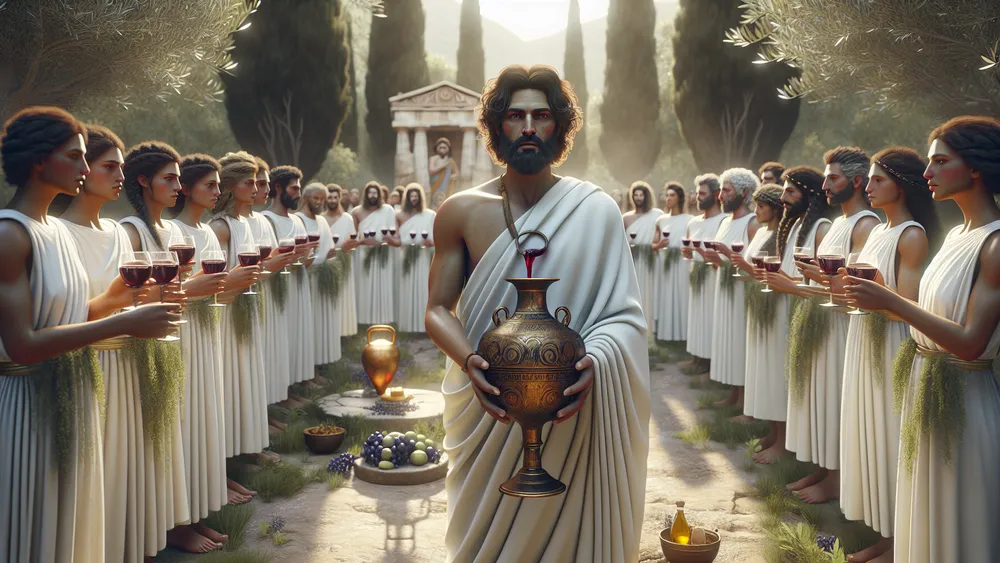Sponde In Greek Mythology: The Horae Spirit Of Libations
Greek mythology, big and complex, brings together gods, spirits, and mortal heroes through myths that mix them with abstract ideas and natural things all around them. Inside all of this, we come across groups of gods who do specific things. One such group is called the Horae, seen as a group of goddesses that stand for balance, order, and how seasons change over time.
Key Points:
- Sponde is the Horae spirit of libations, representing the sacred act of pouring liquids as offerings to honor the gods.
- She is one of Zeus and Themis’s daughters, alongside her sisters tied to peace (Eirene), order (Eunomia), and justice (Dike).
- Libations, like wine or water, were poured during rituals, treaties, or sacrifices to strengthen ties between humans and gods.
- The Horae, including Sponde, symbolized balance in both nature and society, reflecting ideas like harmony and proper conduct.
- Sponde’s role was about rituals, unlike her sisters, who focused on peace, fairness, and rules in society.
- Although no specific myths revolve around her, she is implied in ceremonies where offerings were central.
- Libations were acts of gratitude and respect, holding spiritual meaning across Greek life and religious events.
Not many people have heard much about Sponde, one of these Horae, but she plays a specific and important role. She stands for libations, which were ceremonial offerings of wine or liquids poured as a kind of gift to the gods. These weren’t just simple acts where people gave something to the gods. They meant more.
They let the gods see that people appreciated them, that humans respected them, and it acted as a way for peace to stay between gods and humans. Libations – and the things they stood for – played a key role in Greek practices.
Through this post, we will look at where Sponde comes from, why she matters, and how she fits in with the idea of keeping balance, both in the world around ancient Greeks and in their lives.
Whether this is your first time reading about Greek myths or you already know some, the focus here is to explain Sponde and how she connects to balance, rituals, and life back then.
Sponde: Overview and Key Facts
| Aspect | Details |
|---|---|
| Full Name | Sponde (Σπονδή), which directly translates to “libation” in the Greek language. |
| Type of Deity | A member of the Horae, a group of goddess figures tied to nature and how things work in society. |
| Role | She is the spirit connected with libations, the sacred practice of pouring liquids to honor gods. |
| Cultural Importance | Part of ceremonies that helped maintain peace and friendships between people and the gods, bringing blessings. |
| Parentage | Said to be one of Zeus and Themis’s children, like the other Horae. |
| Siblings | Her sisters include Eunomia (who stands for order), Dike (justice spirit), and Eirene (linked to peace). Other siblings may vary by source. |
| Symbolism | She stands for the meaning behind giving offerings, showing loyalty to the gods, and keeping things balanced in both life and the heavens. |
| Domains | Connected to clean practices in ceremonies, respect for gods’ laws, and proper ways of behaving during rituals. |
| Primary Association | Linked with libation rituals, performed during important gatherings, agreements, and prayers to the gods. |
| Iconography | Rarely shown in visual art, but when she is, she can be seen holding a bowl for pouring (phiale). |
| Mention in Myths | Stories about her specifically are few, though references to libation practices linked with major gods – like Zeus or Apollo – reflect her role. |
| Comparable Figures | Similar to other symbolic deities, such as Ma’at in Egyptian myths, who is connected with the idea of order. |
| Modern Relevance | Sponde stands for ideas like being grateful and staying in peaceful cooperation, themes that remain meaningful in today’s religious or spiritual beliefs. |
Who Were the Horae?
To understand Sponde, it is important to first think about the Horae, a group of spirits from Greek mythology. They are known for standing for key ideas: peace, order, and how nature repeats its patterns. The Horae, at their core, are tied to balance in life. This means they can represent not just nature, but also how people and societies stay organized.
Thinking about their starting point and the key things they stand for, we get a clearer picture of where Sponde fits into the larger setup of mythology.
Where Did the Horae Come From and What Do They Represent?
The Horae, also called the Hours in Greek myths, are figures that represent ideas like order and peace, both in nature and in society. They were said to be the daughters of Zeus, the main Olympian god, and Themis, the goddess of law and justice.
This helps explain why they were thought of as protectors of balance and harmony in both the natural world and human life.

The Horae also reflect how the heavens and the lives of people worked together, keeping everything running smoothly. Each one is connected to a specific idea that helps with how nature repeats itself and how people should live:
- Eunomia (Εὐνομία): She represents law and good management, helping society stay in order and follow rules.
- Dike (Δίκη): The spirit of justice and fairness. Her role includes showing why decisions must be right both for gods and for humans.
- Eirene (Εἰρήνη): She stands for peace, calm, and quiet times when there is no war and life can grow better.
- Sponde (Σπονδή): This goddess represents sacred offerings. She reflects how rituals connect people to the gods through acts like pouring out wine or other liquids as gifts.
These goddesses worked to manage the shifts of the seasons, but they were also responsible for making sure humans lived in agreement with natural cycles and godly laws. Sources sometimes refer to them as forces that guide the yearly cycle of life, which ties them closely to both the heavens and the Earth.
The Horae, daughters of Zeus and Themis, are goddesses symbolizing order, justice, peace, and rituals, linking natural cycles with human laws and harmony.
How Did the Horae Matter in Greek Life?
The Horae were greatly respected in ancient Greek life. They stood for ideas like peace, justice, and order, not only in the natural world but within societies too. People thought of these goddesses as very important powers that connected the detailed patterns of human life to the heavens and the universe.
Their connection to nature included managing the seasons, which the Greeks tied to farming, the ability to grow crops, and marking the rhythm of time. The Horae also meant that life should follow rules, whether in trade, public ceremonies, or how leaders governed. They made sure that relationships between people worked the right way and respected the gods’ laws.

In this way, they had power both over the big cycles, like when spring or winter arrived, and over people’s daily routines. For example, Sponde’s job as the goddess of libations reflected the importance of rituals. Ceremonies to honor the gods with offerings were a way for people to respect and connect with these forces. Even now, people understand the importance of order through shared customs and calendars.
Sponde: Spirit of Libations
After learning about how the Horae are important, it’s time to focus on Sponde, a holy being tied to rituals in ancient Greece. Sponde is about the practice of pouring out drinks for the gods – something that was a key link between people and divine forces.
In religious ceremonies, libations were a way for mortals to show respect, and Sponde helped ensure this relationship was kept strong. This idea of offering something as simple as a drink helped create a connection between human lives and the gods they worshipped.
What Does Sponde Mean in Greek Mythology?
In Greek mythology, Sponde stands for the spirit of libations, which were holy acts of pouring out drinks like wine, oil, or water to honor the gods. These offerings were a way for people to connect with divine forces. Sponde was not just about the act itself but showed how these rituals were important for bringing blessings and respecting the gods.
This practice took something ordinary, like pouring a drink, and made it a meaningful and holy part of life.
In Greek life, Sponde’s role was to help people keep a peaceful connection with the gods. She was tied to key moments during ceremonies, including treaties, sacrifices, and oaths. These events often required rituals where offerings were poured out to strengthen the relationship between mortals and the divine. To see how Sponde’s job compared to her sisters, the chart below explains the differences between her focus and what the other Horae symbolized:
| Horae | What It Represents | Examples of Influence in Greek Life |
|---|---|---|
| Sponde | Libations and holy practices | Offerings poured during treaties, sacrifices, or religious ceremonies |
| Eirene | Peace and calmness | Symbol of a world without conflict and a growing, peaceful society |
| Eunomia | Rules and good leadership | Stood for law and leaders who kept order in how societies worked |
This comparison makes it clear that Sponde focused on religious and spiritual acts, unlike Eirene or Eunomia, who were tied to society’s rules and peace. However, her role was still very important because it reminded the Greeks how rituals brought them closer to their gods.
What Were Libations and Why Were They Important?
In ancient Greek religion, libations were offerings of liquid – usually wine, water, honey, milk, or olive oil – that were poured to honor the gods, heroes, or even the spirits of the dead. These offerings meant showing respect and keeping a good connection between people and the divine. Most of the time, the liquid was poured on the ground, onto altars, or into special containers used for ceremonies.
People often said prayers during this act to make it feel even more important. The Greeks believed these offerings linked the world of humans with the world of the gods. At the start of meals, libations were common. For example, they poured wine to Zeus, the god who protected guests, which helped meals feel peaceful and blessed. Libations were not just about following tradition.
They were also a way to ask gods for help and to keep the world balanced. At harvest festivals, for example, people poured libations to ask the gods for a good harvest. At important events, like making agreements or oaths, these offerings helped make promises feel official in the eyes of the divine.

People also used libations to calm the gods and show they understood how much power the gods had over them. For example, offerings to Demeter, the goddess of the harvest, during the Eleusinian Mysteries, helped ensure good crops, while offerings to Poseidon might make a sea journey safer. In these ways, libations were not just rituals.
They were a way for the Greeks to work with the gods and depend on their strength.
How Libations Were Offered: A Step-by-Step Look
In ancient Greece, libations were done carefully to respect the gods, with every step making sure the ceremony was performed correctly. The first thing people did was pick the liquid they would pour. This choice depended on the god being honored or the type of event.

Most of the time, people offered wine, which stood for life and loyalty, but they also used other liquids, such as water (a simpler offering), honey (linked with sweetness and purity), or olive oil (which was very valuable). Where the offering happened depended on the god and the moment. Sometimes it occurred at an altar or temple, and other times, it took place at springs or sacred groves outside.
Those involved started the ritual by holding a container of liquid, usually a phiale, which is a wide, shallow bowl. They would say prayers or hymns, calling on the gods to ask for blessings or protection. This step was important because it made clear the offering was serious and meaningful.
When it was time to pour, people tilted the phiale carefully toward the ground, or onto an altar, to let the liquid flow slowly. This pouring often included gestures or chants, helping to explain why the act mattered spiritually. At banquets, these offerings sometimes ended with everyone drinking together to honor the connection between people and gods.
Here are the usual steps:
- Choosing the liquid: Picking something fitting, like wine for Dionysus or water for nymphs.
- Preparing the space: Cleaning and setting up the area where the ritual would be performed.
- Prayers or hymns: Calling on a god with spoken or sung words.
- Pouring the liquid: Slowly pouring onto the ground or another spot while focusing on respect.
- Ending the ritual: Saying more prayers, making gestures, or sharing drinks to complete the ceremony.
By following this process, people made sure the offering was done properly. This helped them gain favor from the gods and stay in harmony with them.
Libations in ancient Greece involved carefully choosing a liquid, preparing a sacred space, offering prayers, and pouring the liquid in a respectful way to connect with the gods and gain their favor.
How Sponde Was Connected to Her Sisters
Sponde, as the spirit of libations, worked closely with her sisters, the Horae – Eirene (peace), Eunomia (order), and Dike (justice). Together, they had a shared goal of keeping both the world of humans and the world of the gods balanced and orderly. Sponde focused on the religious and ceremonial acts, like offering libations that helped people stay connected with the gods.
Her sisters, on the other hand, took care of ensuring that society itself stayed peaceful, lawful, and fair. For example, Eirene worked on peace and prosperity, and her role went well with Sponde’s libations during treaties or celebrations, which made agreements feel approved by the gods. Meanwhile, Eunomia dealt with keeping order and creating rules, and Dike focused on justice and fairness.
Both of them played a part in ceremonies where people poured libations, which sometimes helped make judgments or agreements official in the eyes of the gods. These Horae were all closely connected, with each one working on a specific part of the bigger picture. Sponde‘s role was to focus on offerings and rituals, which brought people closer to the gods.

Her sisters, at the same time, worked to keep things like peace, rules, and fairness in place. Together, as parts of a larger group, they helped maintain the balance that the Greek world depended on, both in its traditions and its stories.
Stories or Myths Where Sponde Shows Up
Sponde, as the spirit of libations, does not appear in any big Greek myths as the main character. However, people understood her importance through rituals and ceremonies, especially those with libations. For example, during serious oaths made in treaties or sacrifices to Zeus, libations were used to make the offering feel honest and important.
These acts were part of what represented her symbolic role in maintaining good relationships between people and the gods. At events like Apollo‘s festivals, including the Pythian Games, libations were often poured to honor him before prayers or hymns. These ceremonies are another way we can see Sponde‘s role in Greek practices, connecting her to getting the gods’ approval.
During Mount Olympus banquets, where the gods celebrated while still keeping everything organized under Zeus, libations were poured as acts of respect and thanks. These gatherings give another idea of how Sponde was part of divine ceremonies without being mentioned directly. People can also think of Sponde by comparing her role to similar practices in other places.

In Norse mythology, for example, Aegir, the god of the sea and hospitality, hosted banquets for gods that included drinking and sharing alcohol. These banquets celebrated harmony and cooperation, which is like how libations in Greek ceremonies worked to respect the gods.
In Egyptian mythology, pouring wine or water during temple rituals was common; it served not only as a form of worship but also as a way to clean the space and make it ready for praying. These acts of pouring liquids have a similar purpose to offerings in Greek rituals, where people honored gods like Zeus or Apollo.
By comparing these traditions, Sponde‘s role becomes clearer. She was a way for Greeks to connect with their gods through ritual acts. Whether it was sacrificial prayers to Zeus or toasts at a feast to honor all the gods, her influence touched many acts of religious drinking.
This concept of using offerings to gain blessings and create harmony was not just Greek; it appeared in other religions and myths too. Sponde‘s connection to libations makes her part of a theme shared across ancient traditions.
All the Other Forces Behind Nature and Ideas in Greek Mythology
In Greek mythology, there are many deities and spirits that represent not just natural forces but also abstract ideas. These figures, often called thematic forces, stood for how the universe worked and stayed in balance. For example, Nike stood for winning in battles and competitions, while Nemeses worked to ensure fairness by punishing those who upset the balance.
There were also forces connected more directly to the physical world, like Gaia, who meant the Earth, and Nyx, who represented the Night. These figures were tied to basic and real parts of life that could be seen and experienced by everyone. Taken together, these spirits and gods were important not just in religion but also in everyday life.
They had a part in everything, from farming to the way people thought about right and wrong or keeping promises. If you want to learn more about these natural and abstract forces, you can check out a Greek Abstract and Natural Forces list.
It explains how each figure was connected to the ideas and beliefs in Greek mythology, giving a full view of how these gods were part of life and thought. These figures reflected how the Greeks were linked to both their surroundings and their hopes for the future.
FAQs
1. What is Sponde’s origin story in Greek mythology?
Sponde’s origin story in Greek mythology identifies her as one of the Horae, born to Zeus and Themis, representing the spirit of sacred libations.
2. How were libations associated with Sponde and worship practices?
Libations were associated with Sponde as she personified the act of pouring liquid offerings in worship practices to honor and appease the gods.
3. Did Sponde appear in any specific myths or epics?
Sponde does not prominently appear in specific myths or epics but is implied in rituals and ceremonies involving libations to the gods.
4. How are the Horae represented in ancient Greek art and literature?
The Horae are represented in ancient Greek art and literature as graceful female figures symbolizing order, the seasons, and natural harmony.







